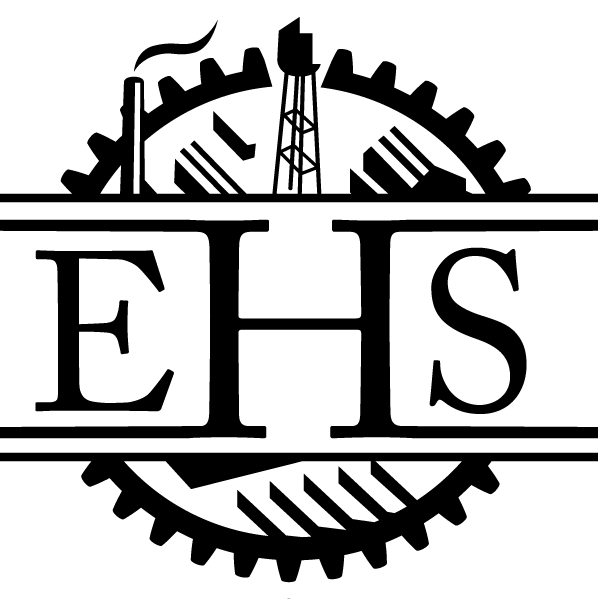
Great Western Meter Company (Now Pirates Press)
The first record of this property at 1290 Powell Street is for the Great Western Meter Company in 1923.
Established in 1920 at 5701 San Pablo Avenue in Oakland, R. J. Lyman presided as President. Great Western Meter manufactured irrigation meters to measure and conserve water. These meters were highly regarded and demand for them both domestically and internationally grew quickly. They were also preparing to enter another market with a meter used to measure the amount of gasoline used on a motorcar.

In 1922, they began work on their new Emeryville facility. The 50,000 square foot plant would cost $125,000 to build.
It was expected to employ 200 men when fully operational.
The two-story, pressed brick factory was sturdily constructed with steel beams and poured concrete floors. It had expansive windows with a third level tower in the center and partitioned into two sections.

The building was constructed with an employee recreation and dining hall, capable of seating 150 persons together.
They moved into their new location in 1923.
In 1926, Great Western Meter Company was under a state probe led by District Attorney Earl Warren for securities violations involving their selling of $18,000 worth of company stock.
It’s not clear if they ever fully utilized the plant as records show many other businesses occupying the facility. In 1927, the Cig-A-Lite Products Company occupied part of the building. Cig-A-Lite manufactured “automatic cigarette servers” for the dashes of automobiles.
Lyman-Green Manufacturing leased space at the facility in 1931. They made a solution to remove paint and enamel.
The Great Western Meter Company completely disappeared from public records after 1933. The great depression is presumed to be a factor in their demise.

In October 1933, The Spirella Company moved into the structure establishing it as their West Coast headquarters. The Spirella Co. produced a line of “figure training” and supporting garments for women including corsets, girdles and belts.
Spirella was founded in 1904 in Niagra Falls, New York. Over a period of three decades the company became the largest manufacturer of corsets and undergarments in the world with plants in several countries.
Their investment in the facility included the purchase of 60 sewing machines and initially employed 50 workers. Tom Jones Meek served as managing director of the plant at the time.
The facility was the site of a significant labor dispute in 1937 when 35 employees, 30 of them women, staged a 40 day “sit-down” resulting in union recognition and improved working conditions.

Spirella occupied the building until about 1940 when it was acquired by The F. E. Booth Company. Founder Frank E. Booth was a pioneer in the development of the packing industry, having established several canneries in California after the turn of the century.
Booth renovated the space for laboratory use calling it the “F. E. Booth Co., Inc. Research and Biological Laboratory.”
The Lab was used in the evaluation of the efficacy of liver and poultry oils. Their experiments reportedly required experiments on “large quantities of chickens and rats.”

Frank E. Booth died in 1941 at the age of 78 and this laboratory closed a few years later. By 1950 the building was occupied by Creative Metals, a firm that manufactured tackle boxes. In 1955, the company secured a contract from the U.S. Army to produce military ordinance.
In the 1980s, at the height of the Windsurfing craze, it was shared by California Sailboards and Carrara’s Cafe.
In the 1970s, California-Omega Foods occupied the space. Omega was a partnership between California Syrup & Extract founder Warren Mooney and Greek entrepreneur Spyro Vrettos. Omega Foods manufactured jarred, shelf-stable foods including Mayonnaise and salad dressings (much of this shipped to Vietnam to support American troops during the conflict).

Carrara’s was known for its comfort food, homey atmosphere and for featuring the work of local artists. Carrara’s, who also shared the building with Marble & Tile Imports, remained open until 1997 (Carrara’s reopened on Broadway in Oakland in 2001 where they lasted until about 2005).
Marble & Tile Imports became Design Centro Italia, an Italian furniture showroom. They occupied the space from about 1995 until about 2013.

In 2015, the building was acquired by Pirates Press, a manufacturing broker for vinyl records, CDs and other merchandise for independent record labels and distributors. They also have their own independent record label, Pirates Press Records.
These “pirates” proudly fly the Jolly Roger flag from the tower’s flagpole, signifying their independent spirit.





